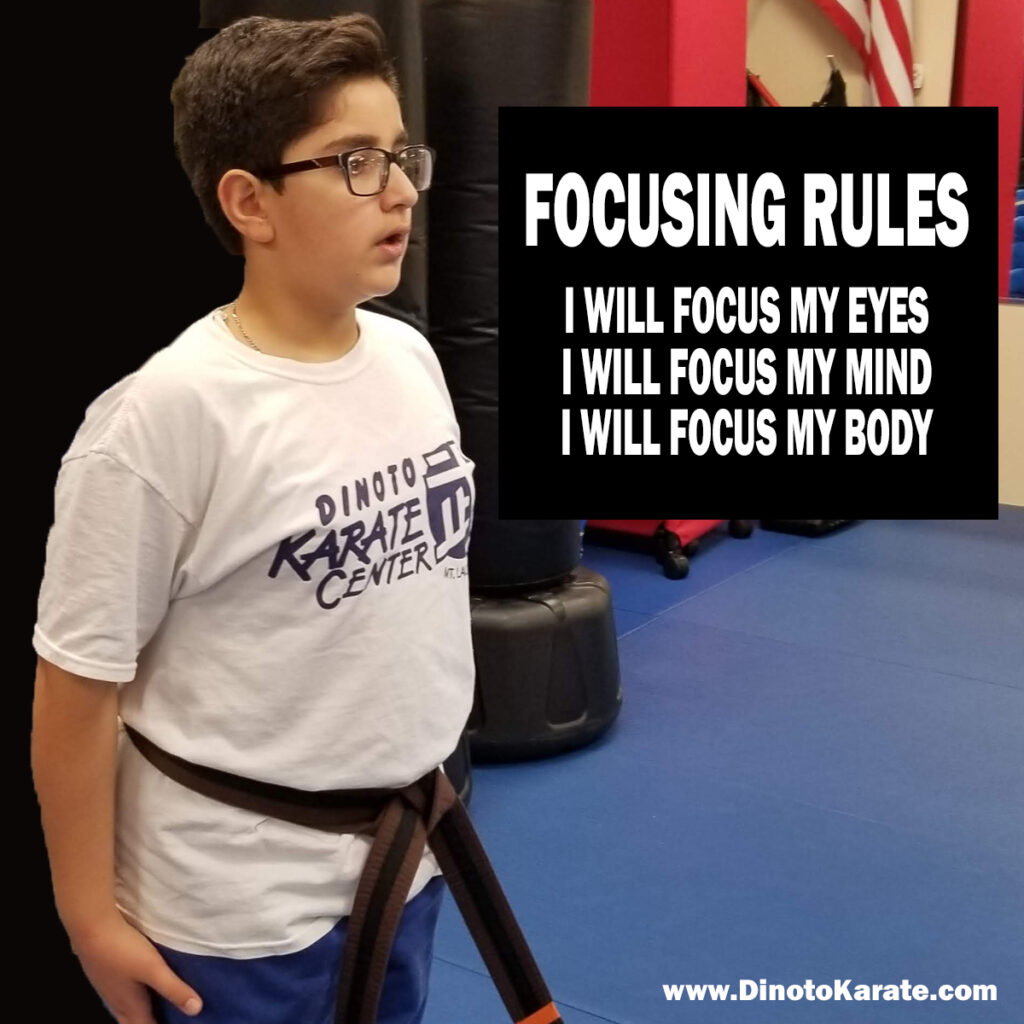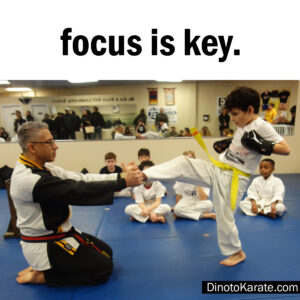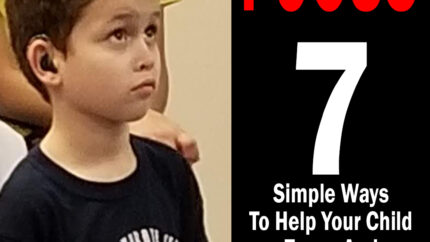
All of our Little Champions classes start with those rules. We start there because we know kids who are 4, 5, or 6 years old are learning about how to control their body and mind. They are learning the big, macroscopic skills that are required for them to start becoming themselves.
Managing focus is a skill that can be learned, a skill that can be practiced, and a skill that can be taught.
Before I get into some ways to help your kids practice focus, I want to talk a little about the importance of focus and concentration. If you’re already convinced, you can scroll right through to the next section.
Why Focus

Parents, I’m sure that at least once you feel yourselves being interrupted by your children. At least when it’s the kids that need your attention, you know that it comes standard in the parent package. You’re probably being interrupted by those pesky cell-phone notifications too. Email, Facebook, Instagram, and every other social network imaginable are mosquitos biting at our attention.
When you feel the urge to check, how long does it take you to get back to flowing through your original task? For me, it takes a noticeably long time.
Your kids are growing up in a world where the demands on their attention are infinite. Every second they have access to all the information in the world. Their generation is going to need to learn how to use that information without it constantly tempting them away from their current task.
If the attention of adults today is fractured—which is a fact so evident that all you need to prove it is a mirror—imagine the internal world our children are growing up with. Overabundant information isn’t the problem. We simply need to teach our kids the skills to thrive in it.
The focus that is required for meaningful engagement is a key metric for life satisfaction. Psychologists like Mihaly Csikszentmihalyi have been researching the mental health benefits of deep, focused work and how to get there for years.
Three Kid approved and teacher tested ways to build Focus
Create focus triggers/anchors
The number one tool I use to help get kids to practice fucus is: The Focus Anchor. They are essentially a soft way to check to see if your child is listening. And, if your child isn’t listening it is a perfect way to help them discover what they should be listening to. Our focusing rules are an example.
We say each of our Focusing Rules and have our students say them back to us. Kind of like those repeat after me songs from summer camp. Okay, maybe the song part is probably just a holdover from my time in the Boy Scouts.
Why does this work?
It gives your child a hint that they should be listening right now. It tells them what to pay attention to.
The truth is, kids are almost always paying attention to something. Especially for young children, everything is new, exciting, and big. They are discovering the world. They’re not actively ignoring their parents and teachers.
Well, sometimes they are. That’s a story for another time.
It’s loud in their little heads. Al this new information and they need to learn what is important. Focus anchors help us cut through the noise and answer the question, “what should I be focusing on.”
Brains are weird. We’re basically wired to respond the same stimulus or trigger the same way repeatedly. It saves mental energy.
You can build a focus anchor from anything. My favorite is if you can hear me clap once, if you can hear me clap twice. The only thing that really matters is that is consistent and that any single focus anchor isn’t over used. I once made a focus anchor out of the song, “Witch Doctor,” and I’ve made another one with the old Red Robbin Commercials.
A little later on I’m gonna talk about how you can use music and your environment into a trigger as well.
FYI: This is why I play LoFi music whenever I’m writing. It’s basically me telling my brain that it is time to sit down and get the job done. I love writing, but I’m distractable enough by nature that I use every tool I at my disposal to make sure it still happens.
Remove Distractions from the environment.
One of the benefits of in-person school is that you’re in a physical space where the rules are different. Kids know that once they are in school its learning time.
Have you ever tried to work on something in the same room that you usually use to relax and watch TV? I’d bet money that you started to get the urge to turn the TV on. Our environment effects zone our brain is in.
We can hack that though. We can set up places for our kids to do certain things. That way they know what they should be focusing on. Especially with all the remote education, it is helpful for even young kids to have their own desk to work at.
Wait!!
I know that not everyone has the space for a whole desk. Get a tablecloth instead and call it their study/school/special blanket. When they’re done needing to focus, take the blanket away so that new room you’ve built is a trigger for learning. You could even try simply putting a stack of books on the table while they work.
It only needs to be a signal that they’re in a different environment.
How we teach focus through Martial Arts
Alright, so how do we teach focus in martial arts. With so many parents that come to us saying that they heard karate is a great way to develop focus and self-control, it amazes me how rarely I hear anyone clearly articulate How?
Yes, we use focus anchors.
Yes, we keep our class is fun and engaging to help our students stay focused in class.
Yes, we talk about self-control with our students at their age level.
The real reason why martial arts works to help build focus and self-control: we practice it in every class.
The ultimate key with focus regulation is that it needs to be practiced. The more frequently they train the better the focus regulation of our students is.
We have plenty of tools that help our students reframe and refocus during our classes. However, the more they are in class the less often they need those tools.
A final tip for parents who are going on a focusing journey.
Okay, I am not personally a parent. I can only attempt to understand how a parent’s desires and hopes for their child affect them as a thought experiment
I do know that whenever I am starting a new, difficult task—I am hard on myself. It is easy for me to look at the mistakes that I’ve made rather than the small, incremental progress that makes a difference.
Celebrate little victories of improving focus. There are plenty of steps to becoming more focused in between the extremes of completely unfocused and constantly focused.
Author is Master Colan Magill a master karate teacher at Dinoto Karate Center in Mount Laurel, New Jersey

